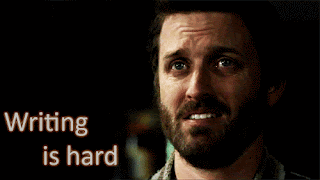Breaking Bad returns Sunday for its final run. Intense and brilliantly crafted, it's one of my favorites, despite sometimes being difficult to watch. Why? Because
Breaking Bad features the ultimate anti-hero. The character who does so much bad, and yet we find ourselves rooting for him to win.
 |
| Breaking Bad final season promo |
In honor of this epic show's last season, I thought I'd break down what makes an anti-hero so compelling, and how writers can use aspects of the anti-hero in their own writing.
(Note: No spoilers here beyond what's shown in the the first episode of the series. All other comments will be general and not plot specific!)
Essential Anti-Hero Traits
Somebody To Root For
Any great main character needs to do something to capture audience loyalty. The title of Blake Snyder's screenwriting book
Save the Cat is about just that--show a character saving a cat, or a good deed, and you begin to win that loyalty.
When
Breaking Bad's Walter White is diagnosed with late-stage cancer, he knows his meager high school chemistry teacher's salary won't be enough to cover the medical bills. After running across a former student fleeing a drug bust, Walter schemes to use his chemistry skills to make meth, a short-term plan to build cash and secure his family for the future.
Of course it's terrible and illegal. But Walt's cancer is inoperable--he may only have months to live. Also, he gets zero respect in his teaching job, his wife is pregnant, and his relationship to his teenage son is fractured. Walter isn't making meth to pay cash for a sports car, he's doing it out desperation to provide for his family. There is a reason he's turning to illicit drugs--the clock is ticking on his life, he's rotting away at a job that doesn't appreciate him, his family needs him.
- Characters who "do bad" for noble reasons give viewers and readers a reason to latch on.
Layers
Dude, this guy is layered. If Walter were just an average chemistry teacher, maybe that's not so endearing. But Walter once worked on a Nobel prize-winning project and co-founded a tech company with fellow researchers. So he's brilliant, but scraping by in Albuquerque's public school system. His son, Walt Jr., could have been just an angsty teen, but his cerebral palsy is another motivating factor for Walter to risk his life to care for his family. The journey becomes more personal--Walter wants to redeem his past failures. His life is a failure, and the cancer serves as a motivator toward extreme behavior.
A rich backstory doesn't always need to be fully explained--I'm pretty sure we still don't know all the details of Walter's falling out with his research partners. But we see this failure revealed through snippets, and each layer makes Walter's criminal behavior more complex.
- Create a rich backstory and layer it in throughout scenes, dialogue, as your plot progresses. Relate your character's flaws to their past hurts, and tie this in to their overall character arc and journey. (easy enough, right?)
Secrets and Lies
Walter surely can't tell his wife Skyler he's cooking meth with a former student, so he constructs little lies (which unfold into more elaborate lies) to explain time away from home and where this cash is coming from. While you see Walter struggle with various aspects of the drug trade, he's accumulating cash, paying bills, and starting to set up provisions for his family. The moral consequences of lying to his family are shown pretty clearly, which leads to much nail-biting; do you root for Walt, or against him?
As with writing, a story doesn't go far if every character tells the truth all the time and suffers few flaws. The key here is motivation. Walt is lying to Skyler for a reason. It doesn't make it right, but we side with him because his intentions are noble. It's his actions that are morally questionable.
- Characters intentionally hiding shades of truth, or spinning the truth to their advantage, especially for a good reason, creates compelling tension and leads to conflict, which every story needs.
Make the Conflict Personal
Walt's meth starts gaining attention in the drug community and with law enforcement--after all, this award-winning chemist isn't going to make a crap product. The head DEA agent on the case happens to be Walt's brother-in-law. What's brilliant about this is it's not Walter's brother, but his wife's brother. Secrets and lies will potentially hurt Skyler more deeply when/if she discovers the truth. Walter evading the DEA might mean no promotion for his brother-in-law (and conversely, if his brother-in-law catches this meth king, then Walter is busted).
Walter's partnership with Jesse is the other greatest source of personal tension on the show. Jesse still refers to his former teacher as Mr. White, and the mentor/mentee relationship plays throughout the series. Walter tries to instill values and education into Jesse at the same time they plot their drug trade. He might not care as much if Jesse was a random guy he had no history with, but given Walter's feelings of failure, he still sees Jesse as a chance to redeem his own personal failures.
- If the main character's decisions directly affect outcomes of other character's lives, the conflict and stakes intensify.
A few other notable anti-heroes:
Dexter Morgan from
Dexter: A serial killer who kills murderers and other serial killers.
Boyd Crowder from
Justified: a career criminal with swagger and loyalty to a rather muddled criminal code.
Amy Dunne from the novel
Gone Girl: is she a victim or a brilliant mastermind? Or both?
What do you think about anti-heroes? Are they compelling, or do they make you hide beneath blankets because of moral quandary?










 Eleanor & Park by Rainbow Rowell (YA). Two awkward, hurting teens support each other in this slow-burn romance.
Eleanor & Park by Rainbow Rowell (YA). Two awkward, hurting teens support each other in this slow-burn romance. Just One Day by Gayle Forman (YA). A trip to the UK, one glorious day of love, and a year of coping with losing that love. Heartbreaking but completely immersive.
Just One Day by Gayle Forman (YA). A trip to the UK, one glorious day of love, and a year of coping with losing that love. Heartbreaking but completely immersive. Second Chance Summer by Morgan Matson (YA): In the vein of Sarah Dessen, a summer love story with strong threads of family and self-actualization. This is a book that stuck with me.
Second Chance Summer by Morgan Matson (YA): In the vein of Sarah Dessen, a summer love story with strong threads of family and self-actualization. This is a book that stuck with me. Imaginary Girls by Nova Ren Suma (YA). A haunting of devotion between sisters and a mysterious lake.
Imaginary Girls by Nova Ren Suma (YA). A haunting of devotion between sisters and a mysterious lake. Where She Went by Gayle Forman (YA). A girl looks in on her life while in a coma. Like the previous book, it's contemporary with hints of other-worldly factors.
Where She Went by Gayle Forman (YA). A girl looks in on her life while in a coma. Like the previous book, it's contemporary with hints of other-worldly factors. The Absolutely True Diary of a Part-Time Indian by Sherman Alexie (YA): Incredible voice, moving without being overly sentimental. Groundbreaking.
The Absolutely True Diary of a Part-Time Indian by Sherman Alexie (YA): Incredible voice, moving without being overly sentimental. Groundbreaking. Thirteen Reasons Why by Jay Asher (YA): A portrait of what it can look like to become suicidal. This is a really important book for the YA market.
Thirteen Reasons Why by Jay Asher (YA): A portrait of what it can look like to become suicidal. This is a really important book for the YA market. The Princesses of Iowa by Molly Backes (YA): Solid contemporary YA with a main character who isn't a shy, nice girl. It's refreshing. Also nuanced and funny.
The Princesses of Iowa by Molly Backes (YA): Solid contemporary YA with a main character who isn't a shy, nice girl. It's refreshing. Also nuanced and funny. Unspoken by Sarah Rees Brennan (YA): A gothic mystery light enough to delight but still managed to be creepy.
Unspoken by Sarah Rees Brennan (YA): A gothic mystery light enough to delight but still managed to be creepy. Is Everyone Hanging Out Without Me (And Other Concerns) by Mindy Kahlin (memoir, humor). Mindy Kahling is my new pop culture hero. You need to watch The Mindy Project, it's so funny!
Is Everyone Hanging Out Without Me (And Other Concerns) by Mindy Kahlin (memoir, humor). Mindy Kahling is my new pop culture hero. You need to watch The Mindy Project, it's so funny! My One and Only by Kristan Higgins (contemporary romance): I read at least 4 Kristan Higgins books this year after loving this one. Small town, quirky families, plucky heroines. She is one of my go-to writers for light romance.
My One and Only by Kristan Higgins (contemporary romance): I read at least 4 Kristan Higgins books this year after loving this one. Small town, quirky families, plucky heroines. She is one of my go-to writers for light romance.















































